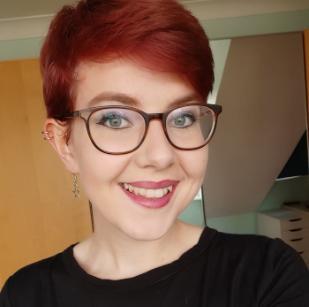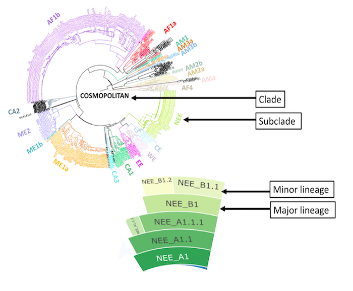Researcher Spotlight - Kathryn Campbell
Published: 9 November 2021
PhD student Kathryn Campbell provides an insight into her project using genomic surveillance and monitoring in the fight against Rabies.
 Can you tell us about your background?
Can you tell us about your background?
I grew up in Essex; in the south east of England (though I managed to never pick up the accent!). I then moved to Lancaster for my undergraduate degree in Biomedicine, where I also undertook a skin cancer research internship and a project on the phylogenetics of Hepatitis D. After my undergraduate degree, it was straight to Glasgow for my PhD!
What can you tell us about your PhD?
My official PhD title is Genomic Surveillance to Guide Rabies Elimination. It’s quite an open title, which has provided me with a lot of flexibility to explore avenues I’m interested in, which has been great!
What is the focus of your research?
My research is currently focused on updating the classification system for rabies virus. The existing classification system doesn’t really have set rules for defining and naming clades which can make it difficult to compare studies and communicate. Also, the existing clades are very broad which isn’t very useful for genomic surveillance and monitoring on a local scale. By creating a system that has rules for defining and naming lineages at higher definition, we can get a much better idea of what is circulating where and how this is changing over time and identify any unusual cases. The tool I’ve developed for this also has a cool acronym I’m very proud of; MAD DOG (Method for Assignment, Definition and Designation Of Global lineages)!
 What do you find most interesting about your work? What has been the most positive aspect so far?
What do you find most interesting about your work? What has been the most positive aspect so far?
I’ve really enjoyed the chance to teach some of the masters students and other PhD students. I’ve done some demonstrating, delivered a few workshops and helped guide a number of people through code issues. And now I’m teaching them how to use the MAD DOG tool for their own work! It’s really cemented my own skills, and helped develop positive relationships with other students in our lab.
What has been the most challenging aspect so far apart from COVID?
When I started my PhD I didn’t really have any coding experience. My project now relies quite heavily on coding ability, so it was quite a steep learning curve! I really enjoy it now, but I definitely struggled at the start.
What advice would you give to anyone doing or considering PhD?
Talk to other people in your cohort, in your lab group etc. A PhD can be stressful and overwhelming at times, and it feels like you’re the only one struggling, but chances are everyone is feeling/felt the same! It really helps to talk openly with other people and learn how to manage/moan about it together! In general it’s an amazing experience, with so many opportunities, but you have to put yourself out there and make the effort to take those opportunities and make new connections.
First published: 9 November 2021

